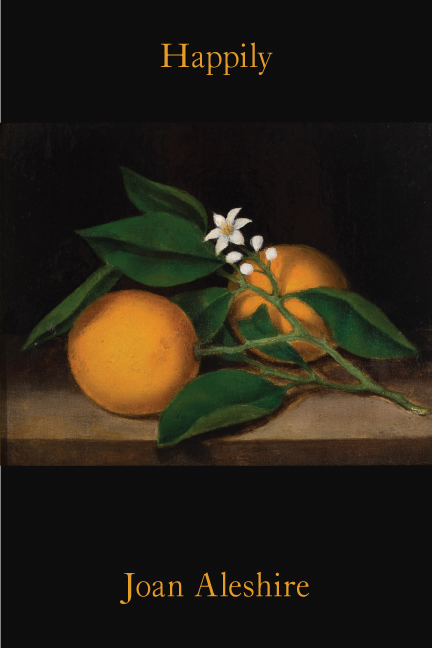
paper • 144 pages • 15.95
ISBN-13: 978-1-935536-22-2
Happily, Joan Aleshire’s fifth book of poems, examines a childhood of privilege and difference in a remarkable Baltimore family during the 1940s and ‘50s. The collection offers vivid glimpses of 20th century history as it explores the trials, challenges and joys of relationships within the family and beyond that have influenced the developing consciousness of a particular self in the world.
Happily strolls through an American half-century in which “the fear of atom bombs would make us / crouch under our desks” and changing cultural values like “The Elvis Argument” and a mother’s “Are you going out in THAT?” led to family rifts. Aleshire’s evocative poems bring to life, in measured vignettes, a time of great upheaval, but they also offer a wise reflection on the power of memory and narrative. In the opening poem, a story of a fall from a horse told to a granddaughter who “sits riveted / by this slip from safety,” while Aleshire’s own childhood is remembered as imaginative games played amid “soldiers in fancy uniforms / killing one another in etchings that lined the upstairs hall.” In one poem, the cleaning-out of a bureau yields tender family secrets in the form of handwritten notes; in another, finding “there’s no one left to ask, of the ones / who might remember,” the narrator turns to her imagination, reminding us that poetry, like memoir, binds people together as audiences, listeners, and tale-tellers: if it’s often the case that “the camera preserve[s] us,” Aleshire’s poems set pictures and details in rhythmic motion.
BEFORE
As she described it,
that summer was the hottest ever.
Two months pregnant, too sick
to eat, she lay on the porch
reading The Pickwick Papers,
which may explain my inclination
to laughter. She took pills
for the nausea, which may explain
my arms’ inclination to the strange.
In the album,
at the beach, she leans back
on her elbows, stretches out
in a modest but revealing suit
that shows her thickened waist.
She wears dark glasses with
stylish light frames: carefree,
all our life before her.
In these graceful, highly-detailed poems, Aleshire investigates a privileged childhood and young adulthood of the 1940’s and 50’s, a time so different from our own as to be truly from another world. If one of the functions of poetry is to freeze moments in time, Aleshire succeeds brilliantly in this chronological sequence beginning with birth and moving year-by-year, and sometimes month-by-month to her mother’s death. The effect of such a richness of detail is almost like seeing a film of a sixty-year period, except that these are poems and display an excellent poet’s control of language and all of a poet’s complicated tools. Aleshire’s poems are as much sound as sense, and together they don’t so much talk about a vanished time as recreate it with all its many levels of actuality and gradations of emotion.